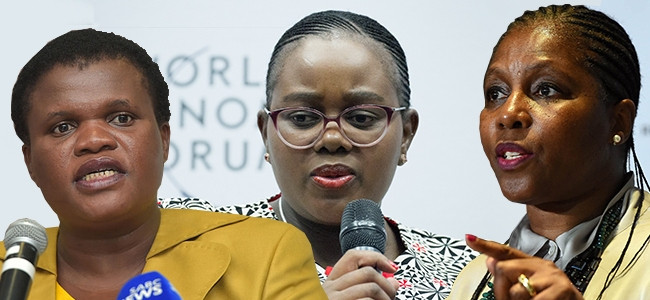
In March, president Jacob Zuma ushered in new members to the national executive that included the appointment of two new ministers at the Department of Communications (DOC). Fast-forward six months, there is another minister who has been tasked with overseeing the department.
Yesterday, in a surprise Cabinet reshuffle, Zuma announced the appointment of Mmamoloko Kubayi as communications minister. Kubayi, who up until yesterday was minister of energy, replaces minister Ayanda Dlodlo, who has been shuffled to the Department of Home Affairs.
Thandi Mahambehlala retains her role as DOC deputy minister.
Zuma's decision to reshuffle his Cabinet again - the communications portfolio ushers in another department head in the same year - makes Kubayi's appointment the third leadership change since the president "reconfigured" the DOC.
Legacy issues
Over the years, the communications ministry developed a reputation for being dysfunctional and remaining out of touch with the sector it is supposed to work with.
Leadership issues within the department also contributed to its dysfunctional state, with outgoing heads leaving under clouds of controversy. Former minister Dina Pule is renowned for having accomplished very little under her tenure. Other ex-ministers include the late Roy Padayachee and Siphiwe Nyanda.
Following Zuma's 2014 decision to form a new Department of Telecommunications and Postal Services and a "reconfigured" DOC, it seemed there was a glimmer of hope for the communications ministry.
The president said the communications department would be responsible for overarching communication policy and strategy, information dissemination and publicity, as well as the branding of the country abroad.
The president announced the new communications ministry would be made up of the Independent Communications Authority of SA, the SABC, Government Communication and Information Systems, Brand SA and the Media Development and Diversity Agency.
Critics labelled the new communications ministry as the "department of propaganda". The announcement of Faith Muthambi's appointment as minister also raised red flags among industry pundits.
During her tenure, Muthambi attracted lots of criticism and there were numerous calls for her to be removed from the communications portfolio. Muthambi was left unscathed in the president's last reshuffle and was deployed to the ministry of public service and administration.
Personal interests
ICT veteran Adrian Schofield says this reshuffle, like its predecessors, has nothing to do with ministerial performance and everything to do with protecting the state president's personal interests.
"The department was split from the old DOC with one objective to give the president more control over the flow of information to South African voters a propaganda ministry in the best traditions of other repressive states.
"The leadership changes reflect the problems of trying to control access to information in a wilfully free society. The evidence is plain, in the chaotic SABC, the lunatic proposal to control Internet content and the failure of the digital migration project."
Frost & Sullivan's programme manager for the digital transformation practice, Anesu Charamba, is of the view that the reshuffle will probably result in delays to the implementation of the digital migration project, overall management and leadership across the DOC.
"This will be primarily due to the time required for minister Mmamoloko Kubayi to acclimate to her new role and from there lead the department in their various initiatives."
According to Schofield, there are rumours that the two departments might merge again.
"The 'old' DOC was much more stable under ministers like Jay Naidoo and Ivy Matsepe-Casaburri and with Andile Ngcaba as director-general. Unlike his predecessors, president Zuma seems to have no interest in using ICTs to grow South Africa socially and economically, only in using them to monitor and control the population while lining the pockets of his inner circle."
Digital migration hurdle
Like her predecessor, Kubayi inherits a department that is driving one of government's key projects, the broadcasting digital migration programme, which has had serious set-backs and is now severely past deadline.
SA missed the June 2015 deadline set by the International Telecommunication Union (ITU) for countries to complete the full switch from analogue to digital terrestrial television. The ITU has called on nations to switch over to allow radio frequency spectrum to be freed up for mobile broadband services.
When Dlodlo took office at the communications department, she committed to ensure digital migration moves ahead and for the department to meet the December 2018 deadline, which is now less than 15 months away.
Schofield says past experience suggests further delay and possibly another reversal on encryption with regards to SA's digital migration project.
After taking office, Dlodlo said she would follow the ANC policy with respect to the digital migration process, despite a Constitutional Court ruling in favour of non-encryption for government-subsidised set-top boxes.
"The digital migration deadline has never concerned the ANC government. I see little rushing, in spite of minister Dlodlo's statements," states Schofield.
Share